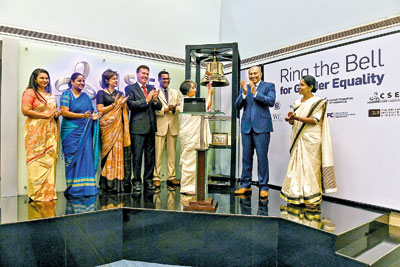Gender Equality at CSE: Maithree rings bell for diversity, unity and peace in SL
View(s):“None of us lives everyday life on the basis of a singular and unitary identity. Rather, we are an assemblage of multiple identities, and we may foreground a specific identity in a given context, perhaps vis-à-vis our profession, sexual orientation, language, class, geography, education, politics, age, ability or disability, and so on.”

The ceremonial 'ringing-the-bell. by Prof. Maithree Wickremesinghe.
Making the keynote speech on Wednesday to ring the opening bell for trading to celebrate International Women’s Day 2018 the Colombo Stock Exchange (CSE) for the third consecutive year, Prof. Maithree Wickremesinghe made these remarks noting that “and we must remember that it is the sum of this whole that constitutes our sense of self”.
While condemning the social media propaganda that was ongoing due to racial unrest in Teldeniya, Kandy, she said that people didn’t ‘adequately condemn’ the unadulterated social propaganda and hate speech against Muslims on social media such as Facebook.
Access to Facebook, Viber, WhatsApp and all other social media networks have been blocked temporarily in the country by the telecom regulator since Wednesday morning.
“The last month or so has seen an aggravated, incendiary and concentrated campaign against the Muslim people and certain religious sects in this country by some who have openly identified themselves as Sinhala Buddhists, much against the core teaching of the Lord Buddha – detachment. You will agree with me that the campaign is not only racist and ignorant but it is also sexist. And most regrettably, this week, the campaign has culminated in the deaths of two boys and mob violence. She said that apart from the gangs on ground, the battles were also fought anonymously on social media – which has now become a medium for the expression of unadulterated opinion.
“Equality involves accepting commonality – considering the common rights of men and women. Primarily it involves looking at numbers – in terms of nomination and domination, representation and industries, within horizontal and vertical work sectors and structures and so on. And considering what can be done to rectify these unequal gender balances.” She highlighted the need to look at gender beyond gender equality – beyond entry and participation; and the need to look at gender equity.
“But why make a distinction between gender equality and gender equity? Because gender equity involves looking at differences between men and women; but more importantly, between men and men, and women and women – to identify and target the differential needs, interests and priorities of men and women that are based on biology, social conditioning, and life experiences. For instance, when appointing women to corporate boards, the different perspectives, leadership principles and styles that they may bring in need to be valued. There is a need to acknowledge gender micro-aggressions and micro-politics in the workplace – for instance, the marginalisation of certain workers, or the presence of a highly sexualised work culture can often lead to a hostile work environment – especially for women,” Prof. Wickremesinghe added.
IFC, a member of the World Bank Group, partnered with CSE on this initiative that highlights how the private sector can spur women’s participation in the global economy and promote sustainable development.
Studies show that female talent is among the least utilised economic and business resources around the world. Making even small inroads in closing the global gender gap could quickly yield strong results, with the potential to increase global gross domestic product by US$5.3 trillion over the next seven years, according to a 2017 report from the World Economic Forum. For listed companies, failure to capitalise on these resources—for example, by adding more women to their boards and ranks of senior leadership—represents a substantial opportunity cost, according to the IFC.
“At the Colombo Stock Exchange, we encourage companies to prioritise diversity in their own corporate structures by implementing gender-friendly workplace policies; developing female-oriented investment products; reporting on diversity objectives, policies, and practices; and increasing the number of women holding board and senior leadership positions,” Rajeeva Bandaranaike, CEO, CSE said in his address.
In Sri Lanka, latest research indicates that about 8 per cent of listed company board directors are women. While this compares well with the rest of Asia, more can be done.
“Women across emerging markets like Sri Lanka are making vital contributions to private sector growth through strong corporate leadership,” said Amena Arif, IFC County Manager for Sri Lanka and Maldives. “We are excited to work with our partners though the DFAT-IFC Women in Work programme to expand the discussion on board diversity and help more companies retain and attract senior women to serve on their boards.”
IFC’s support for gender-smart business solutions includes working with companies in developing countries to generate opportunities for women that also contribute to bottom-line benefits.
The ‘Ring the Bell for Gender Equality’ event is a partnership of IFC, Sustainable Stock Exchanges (SSE) Initiative, the UN Global Compact, UN Women, Women in ETFs, and the World Federation of Stock Exchanges.


